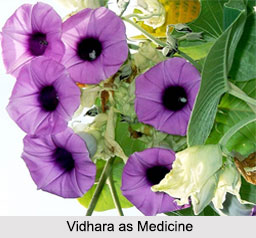 Vidhara, also known as Argyreia Speciosa has been used in the traditional system of medicine in India as an ingredient of many formulations. The root of Argyreia Speciosa is regarded as alterative, tonic and useful in rheumatic affections and diseases of the nervous system. It is said to improve the intellect, strengthen the body and prevent the effects of age.
Vidhara, also known as Argyreia Speciosa has been used in the traditional system of medicine in India as an ingredient of many formulations. The root of Argyreia Speciosa is regarded as alterative, tonic and useful in rheumatic affections and diseases of the nervous system. It is said to improve the intellect, strengthen the body and prevent the effects of age.
Dose of Vidhara in Medicine
As an alterative and nervine tonic it is prescribed in the following manner. The powdered root is soaked, 7 times during 7 days in the juice of the tubers of Asparagus racemosus (satamuli) and dried. The resulting powder is given in doses of a quarter to half a tola with clarified butter for about a month. In synovitis the powdered root is given with milk.
Ajamodadi Churna: Take ajwain, baberang, rock salt, plumbago root, Cedrus deodara, long pepper root, long pepper, black pepper and dill seeds each 2 tolas, chebulic myrobalan 10 tolas, root of Argyreia speciosa 20 tolas, ginger 20 tolas; powder and mix. Dose is about 2 drachms with treacle. This preparation is said to be useful in rheumatic affections and hemiplegia.
This article is a stub. You can enrich by adding more information to it. Send your Write Up to content@indianetzone.com
Related Articles
Ayurveda
History of Ayurveda
Origin of Ayurveda
Ayurveda Medication
Elements of Ayurveda
Concepts of Ayurveda
Ancient Literature of Ayurveda
Sushruta Samhita
Classification of Medicine




















